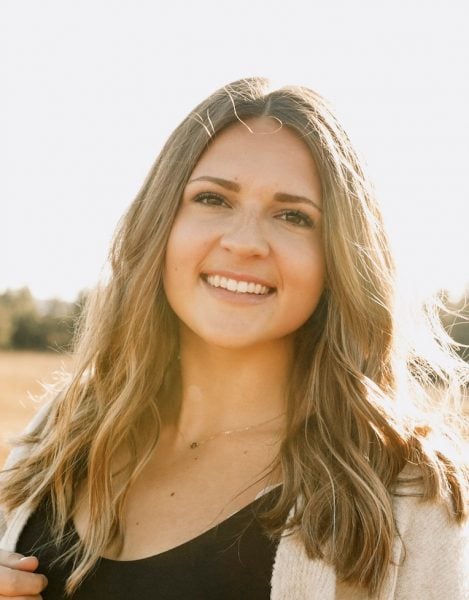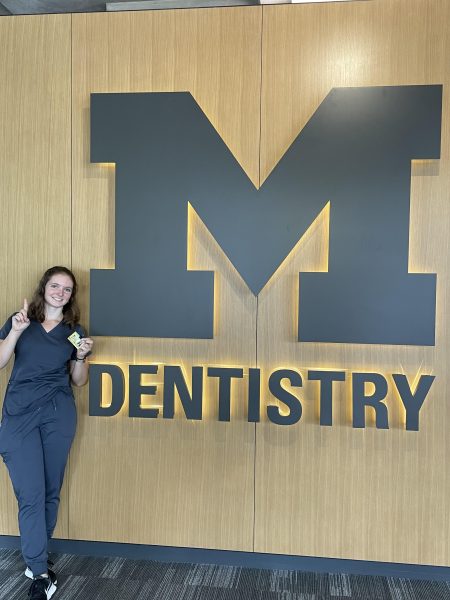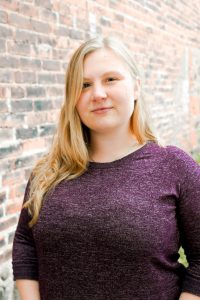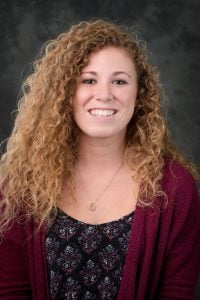
My name is Alexa and I am currently an Occupational Therapy student at Concordia University Wisconsin.
As an undergraduate student at Michigan Tech, I studied Exercise Science and also earned a minor in Psychology. As a pre-Occupational Therapy student at MTU, I was able to learn about the human body from many different perspectives. In addition to kinesiology and psychology classes, I also took courses in biology, biochemistry, anatomy, physiology, kinesiology, nutrition, neuroscience, epidemiology, neurology, mindfulness & meditation, psychopathology, & archaeology. Every course I took at Michigan Tech helped me become the occupational therapy student I am today, as OT is a holistic medical profession that highlights all branches of human health. That said, having a focus on movement science was especially helpful when learning the basics of the human body.
I chose occupational therapy as my future profession because it combines science and creativity effortlessly. For example, if two different clients came to see me for carpal tunnel treatment, their treatment plans would look very different from each other, even with the same diagnoses. Each patient requires treatment based on their unique occupations; things you need, want, and are expected to do in society. I was drawn to the vastness of opportunity that this career holds. I will never be bored and will always be helping others live their life to the fullest as an occupational therapist. Additionally, being an occupational therapist will require action through advocacy. Advocating for the profession as a whole, future clients, populations, as well as myself is something I am passionate about.
I went into my first semester at MTU nervous to get involved but quickly shed that fear. While I was at Tech I spent a lot of my time in the athletic training room, in the sleep research lab, and out in the campus & local communities promoting healthy habits & lifestyle changes. I invested time into experiences that I was passionate about. Through these experiences, I gained confidence in professional and medical language, developed interpersonal skills, and sharpened my analytical skills.
None of this would have been possible if I did not network with my professors, academic advisors, and mentors. The people at Michigan Tech are what sets my experience apart from what “could have been”. I truly don’t think I would have had the opportunities I did at MTU had I went elsewhere. The class sizes are small, the librarians and tutors are helpful, and the community that Michigan Tech creates is a safe one.
I applied to Concordia University – Wisconsin’s program right on time. CUW’s OT program was one of the only post-baccalaureate programs in the country to have a January start. I just so happened to graduate in December and knew if I had the choice, I wanted to head right to OT school. If I hadn’t been accepted, I would have applied to other schools and took the next few months to take a breather. But, it was fate, so I packed my bags and headed South to Milwaukee! Concordia’s OT program is a great fit and the view of Lake Michigan even reminds me of home.
My number one piece of advice is to take initiative when planning for your desired successes. When applying to OT school you should stay organized and be intentional about the choices you make starting your very first semester of undergrad. Talk to your pre-health advisor to plan both your academics and extracurriculars. I would also highly suggest shadowing practicing occupational therapists throughout your undergraduate career. This helped me directly learn about OT and stay excited about my future even when I was overwhelmed with the common stresses of school.



 My name is Lindsay Winter, and I currently a first-year student at Central Michigan University’s Doctorate of Physical Therapy (PT) program. At Michigan Tech, my undergrad degree was in
My name is Lindsay Winter, and I currently a first-year student at Central Michigan University’s Doctorate of Physical Therapy (PT) program. At Michigan Tech, my undergrad degree was in